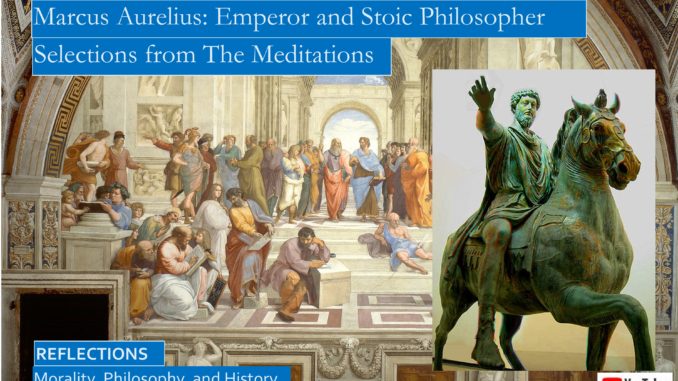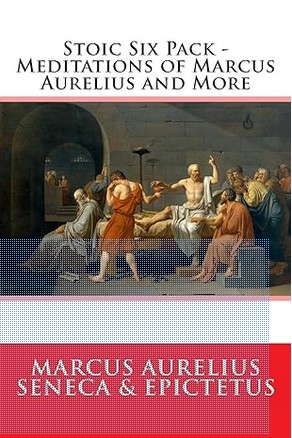
Marcus Aurelius tells us that we should always remember that if men do not do right, we should assume that “they do so involuntarily and in ignorance. For as every soul is unwillingly deprived of the truth, so also is it unwillingly deprived of the power behaving as it should.”
We should “consider that we also do many things wrong, that we are merely men, that even when we refrain from certain faults, we still have the disposition to commit them, either through cowardice, concern about reputation, or some other mean motive.”
Marcus Aurelius Blog 1 http://www.seekingvirtueandwisdom.com/marcus-aurelius-blog-1-friend-or-foe-or-both-of-christianity/
(We now prefer the Waterfield translations.)
YouTube video for blogs 2-5: https://youtu.be/0qHpReZYhv4
YouTube script for more book links: https://www.slideshare.net/BruceStrom1/marcus-aurelius-and-his-meditations-stoic-view-of-life
We should “consider that we do not even understand whether men are doing wrong or not, for many things are done according to circumstances. Men must know a great deal to pass correct judgment on another man’s acts.”
We should “consider when you are much vexed or grieved, that man’s life is only a moment, and shortly we shall all be dead.”
We should consider “that it is not men’s acts that disturb us, but it is our own opinions that disturb us. Take away these opinions, set aside your judgment, and your anger will disappear. How shall we take away these opinions? By reflecting that no wrongful act of another brings shame on you.”
We should “consider how much more pain is brought on us by our anger and vexation of our neighbor’s acts than the acts themselves.”
We should “consider that a good disposition is invincible, if it is genuine and not an affected smile acting the part.” If we are kind and gentle and truly empathetic, we sometimes can admonish our enemies with tact even as they are trying to do us harm. But we are warned, “we cannot do this in irony or rebuke, but with kindly affection and without any bitterness of heart, not as from a master’s chair, nor yet to impress the bystanders, but as if he were indeed alone even though others are present.” We must remember he was the emperor, so this point perhaps applies most to those of us who are teachers or managers or parents.
If I may be so presumptuous to add to this list, not really an addition but rather a derivation of the other points:
We should consider when someone says or does something to vex or harm us, that we may be collateral damage, that they may be responding instead to someone in their past who hurt them, maybe an evil stepfather, or an unkind parent or spouse, or an unkind teacher or boss, or maybe they inherited their nasty disposition from their parents who were hurt many years but some forgotten person six feet under somewhere.
This is how true men respond to those who offend them, true men with strength, nerves, and courage, true men not subject to fits of passion and discontent. Marcus Aurelius urges us to “remember these rules as if you had received them as a gift from the Muses, and begin at last to be a man while you live. You must equally avoid flattering men and being vexed at them, for both are antisocial and harmful. Remember this when your anger flares, that it is not manly to be moved by passion, but rather true men are moved mildness and gentleness.”[1]
The most common situation where we are tempted to needlessly flare up in petulant anger is when we feel some low paid clerk or waitress has not served us well in a store or restaurant. We neglect to realize how little they are paid, how their servant’s paycheck brings with it poverty and misery. The best illustration of how the advice in Meditations can illuminate our modern souls is this letter:
“Dear Ann Landers: I want to share a recent discovery that has made me a better person. Maybe some of your readers will see themselves.”
“I used to assume that a wealthy woman I knew slightly was an arrogant snob because she rarely spoke and never smiled. I also had the notion that the woman in the supermarket with the whining children was a lousy mother.”
“Then one day, as I stood in line at the grocery store, I noticed that the clerk never smiled at the customers and ignored polite conversation. I was tempted to tell her what I thought of her sour attitude when the elderly woman in front of me took a different approach. She said, ‘Honey, you look like you’re having a bad day.’ The clerk looked up with the saddest eyes I’ve ever seen and said, ‘My husband lost his job yesterday, and I just found out I’m pregnant!’ The lady patted her hand and said, ‘Dear, things will work out.’ When it was my turn, the clerk had tears in her eyes, but she smiled, and I felt ashamed of myself for being so intolerant.”
“That incident made me realize that people usually aren’t rude because they are mean and want to make my life miserable. They are unpleasant because they have problems on their mind and a heavy heart. My entire outlook on life changed that day, and I am now much more compassionate.”
“I now assume the frowning woman might be worried about the results of a biopsy, the rude young driver could be on his way to the emergency room to meet an injured relative, and the distracted mother with the screaming child in the supermarket may need my smile and a kind word–perhaps the only ones she will get all day.”
“This change in attitude has made those around me happier, but the greatest benefit is mine. I am less angry and more serene, and I like myself better than I used to. Singed, Older and Wiser (and more stoic) in West Virginia.”[2]
So, the next time you are in a restaurant, and you get really bad service, and you are tempted to stiff the waitress, try to imagine life as she is living it, ask her if she is having a bad day, and tip her more than you would normally, for you know many people have stiffed her already. Remember, fate is already punishing her abundantly, for she is a waitress!
We in America are often angry at the poor, we disdain to help the poor, we seek to cut welfare so we can cut taxes. We are often angry at the poor for not being industrious, not going to school, not pulling themselves up by their bootstraps, not making something of themselves.
This reminds me of a segment I watched in a psychology video, they pictured an odd fellow, an energetic scatter-brained handyman who seemed a little bit off, and they related his story. He was formerly a top-notch corporate attorney earning six figures in a top-notch New York law firm, and one night, he suffered a stroke. He woke up, was taken to the hospital, he thought he recovered, he went back to work, and would sit for hours in the law library, clueless as to what he should do. He lost none of his intelligence, his memories and schooling were intact, but he had lost the mental ability to concentrate on abstract tasks. Today he is a busy handyman.
The next time you are tempted to be angry at the poor, remember that their poverty may not be their fault, it is impossible for you to tell. Some of them were not blessed by God with the intelligence necessary to tackle more mentally challenging jobs.
Marcus Aurelius closes Book XI with a Socratic dialogue:
“Socrates use to say, ‘What do you want? Souls of rational men, or irrational?’
‘Souls of rational men.’
‘Of what rational men? Sound or unsound?’
‘Sound.’
‘Why do you not seek them?’
‘Because we have them.’
‘When then do you quarrel and fight?’[3]
Why, indeed, do we quarrel and fight? For what?
For his last Book XII Marcus Aurelius discusses the stoic attitude, bidding us “to take no notice of the past, and trust the future to Providence, and live life today with piety and justice. Living your life in piety means being content with the lot that is assigned to you. Living your life in justice means always speaking the truth freely, free of deception,” living according to the universal moral law, respecting the dignity of our neighbors. Let neither another man’s wickedness or opinion or mistaken belief hinder you, nor should you let the weakness of the flesh deceive you.[4]
Would Marcs Aurelius have discouraged Rosa Parks from sitting in the whites-only section in the bus in Montgomery, Alabama? She was certainly not content with the lot dealt to her by the Jim Crow culture of Alabama. But who was on the side of justice? Rosa Parks or Jim Crow?
If Rosa Parks were a lone grandmother in the middle of Alabama, according to Stoic principals, under Stoic principals she probably should not have tried to sit in the whites-only section of the bus, for Jim Crow was not a system that a lone protester could overcome. But although Rosa Parks was a sweet grandmother, she was also the local secretary for the NAACP, this was not a spur of the moment action made in anger, this was a soberly planned protest in a legal challenge to the entire Jim Crow system. Rosa Parks was following in the steps of Homer Plessy.
If Marcus Aurelius could battle with the barbarians and still be a stoic, for sometimes war is necessary, so stoicism approves of Rosa Parks going to battle against Jim Crow by sitting the whites-only of the bus in Montgomery, Alabama. Marcus Aurelius would certainly like Rosa Parks to dream that someday all “children will one day live in a nation where they will not be judged by the color of their skin but by the content of their character.”[5] But the principals of stoicism bid us not to be carried by our emotions, by our fears, by our hatreds, by our mistrust, to realize that someone of a different race, whether they be white or black, may fear us as much as we fear them, for mirroring reasons, and above all stoicism bids us to be tolerant and forgiving of the faults of our neighbors, especially when there is a history behind the fears and mistrust.
Stoicism really does not directly address how the Rosa Parks of this world should live their lives because the social structure of the ancient world was quite rigid, but stoicism can work in a more just modern society, stoicism is timeless. Stoicism promotes both contentment with your lot and justice, and sometimes there is tension between these qualities.
How would stoicism work for people like Rosa Parks? First, rarely should you respond out of anger, your reason should control your anger, you should never let your anger control you, think before you act, think before you talk. If you are a little guy suffering an injustice that you cannot change, you should let it go and not be angry, particularly if the stakes are small. If you can join in a collective action to address injustice, you should act for the benefit of the whole group rather than yourself, if possible. If the stakes are as large as the injustice, and an attorney can take your case on a contingency basis, let him take the case, but since the attorney is doing his job you do not need to be angry, so you should not be angry.
Marcus Aurelius observes, “God sees into the minds and hearts of all men bared naked of vestments and rind and impurities.” You cannot fool God, God cannot be deceived. God made us, we are His, he made us in His likeness, and since our intellect is a reflection of His intellect, God understands our very thoughts.
“Does the light of the lamp shine without losing its splendor until it is extinguished; and shall the truth that is in you and justice and temperance be extinguished before your death?” As Winston Churchill so aptly puts this when describing the fight against the evil of Nazi Germany, “Never, Never, Never, Never, Give Up.”
“If it is not right, do not do it; if it is not true, do not say it,” do not even think that which is not true.[6]
Book Reviews: Greco-Roman Stoic and Cynic Philosophers, and Epicurus
[1] Marcus Aurelius, “Meditations,” Book XI, 85-92.
[2] http://articles.chicagotribune.com/1997-04-05/news/9704050011_1_dear-ann-landers-rude-clerk, April 5, 1997.
[3] Marcus Aurelius, “Meditations,” Book XI, 92.
[4] Marcus Aurelius, “Meditations,” Book XII, 93.
[5] Martin Luther King’s “I Have a Dream” speech, http://www.americanrhetoric.com/speeches/mlkihaveadream.htm
[6] Marcus Aurelius, “Meditations,” Book XII, 93 – 96.







The idea of compassion and understanding to assuage anger is excellent.The idea of taxing (which is coercion) to fix the plight of the poor is not.Giving government resouces to fix social ills leads to corruption and really has done nothing to relieve social ills.Giving people opportunity and education so they become self sufficient is the true way to justice for all.